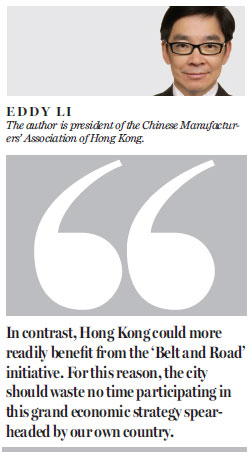We need not rush into the TPP
Updated: 2015-11-16 08:22
By Eddy Li(HK Edition)
|
|||||||||
Eddy Li writes that the SAR can more readily benefit from 'Belt and Road' than from the TPP, which would require extensive negotiation for potentially little gain
Weeks ago, Director-General of the Trade and Industry Department Kenneth Mak Ching-yu was invited to the dinner after the board meeting of the Chinese Manufacturers' Association (CMA) of Hong Kong to shared his views about the prospects for Hong Kong's trade and industry sector with CMA directors.
His speech, on account of it being a heated topic in recent days, naturally focused on the Trans-Pacific Partnership (TPP) agreement and the "Belt and Road" strategic initiative. The US-led TPP trade pact, as we all know, is more or less directed against China. In this case, should Hong Kong endeavor to join the TPP? In response, Mak pointed out that as a firm believer in and supporter of free trade, Hong Kong welcomes any agreement beneficial to global trade liberalization. Many of the 12 founding members of the TPP are important mercantile partners of Hong Kong. Thus Hong Kong has been paying extra attention to its negotiation process. Mak believes that the SAR government will evaluate the influence and feasibility of Hong Kong joining the TPP after its specific rules are released and researched in depth.
According to Article 151 of the Basic Law, "The Hong Kong Special Administrative Region may on its own, using the name 'Hong Kong, China', maintain and develop relations and conclude and implement agreements with foreign states and regions and relevant international organizations in the appropriate fields, including the economic, trade, financial and monetary, shipping, communications, tourism, cultural and sports fields." This guarantees Hong Kong the freedom to make its own decision on whether or not to join the TPP.
With the decision-making power in our own hands, however, we need not rush into a decision. The TPP's provisions on rules of origin are strictly designed to ensure that only goods that originate in the TPP region receive preferential treatment under the agreement. Many Hong Kong businesses have moved their factories to the mainland or Southeast Asia over past decades, so there might be only a few of our products that are eligible to enjoy the privileges provided by the TPP. To reap the full benefits of it, Hong Kong needs to negotiate for its admission into the pact with all TPP founding members. This is definitely not an easy job.
In contrast, Hong Kong could more readily benefit from the "Belt and Road" initiative. For this reason, the city should waste no time participating in this grand economic strategy spearheaded by our own country. The first step for Hong Kong to participate in it is to clear off all trade barriers and establish trading partnership with as many countries or regions in the "Belt and Road" area as possible. This is exactly what the SAR government is trying to do. It is sparing no effort in negotiating with other governments on free trade agreements (FTAs). At the moment, negotiations are going on for three FTAs, namely the FTA between Hong Kong and the Association of Southeast Asian Nations (ASEAN), the ASEAN Framework for Regional Comprehensive Economic Partnership (RCEP), and the Hong Kong-Macao Closer Economic Partnership Arrangement (CEPA).
The negotiation with ASEAN, which started in July last year, has now gone through four rounds of negotiation, with another round to be held in Hong Kong next month. So far, the process has been smooth, and the negotiation is expected to finish in 2016. Once a FTA agreement between Hong Kong and ASEAN is successfully achieved and signed, Hong Kong will be able to join the RCEP between ASEAN and its six free-trade partners, including the Chinese mainland, Japan, South Korea, Australia, New Zealand and India, further reinforcing Hong Kong's position as a trade center in Asia.
When achieved, the CEPA between Hong Kong and Macao, together with their respective CEPA agreement with the mainland, will form a larger free trade platform which will eventually strengthen the free flow of trade and investment in the region. It will not only bring about new business opportunities to all three parties, but also give a strong push to the implementation of the "Belt and Road" strategy.

(HK Edition 11/16/2015 page9)